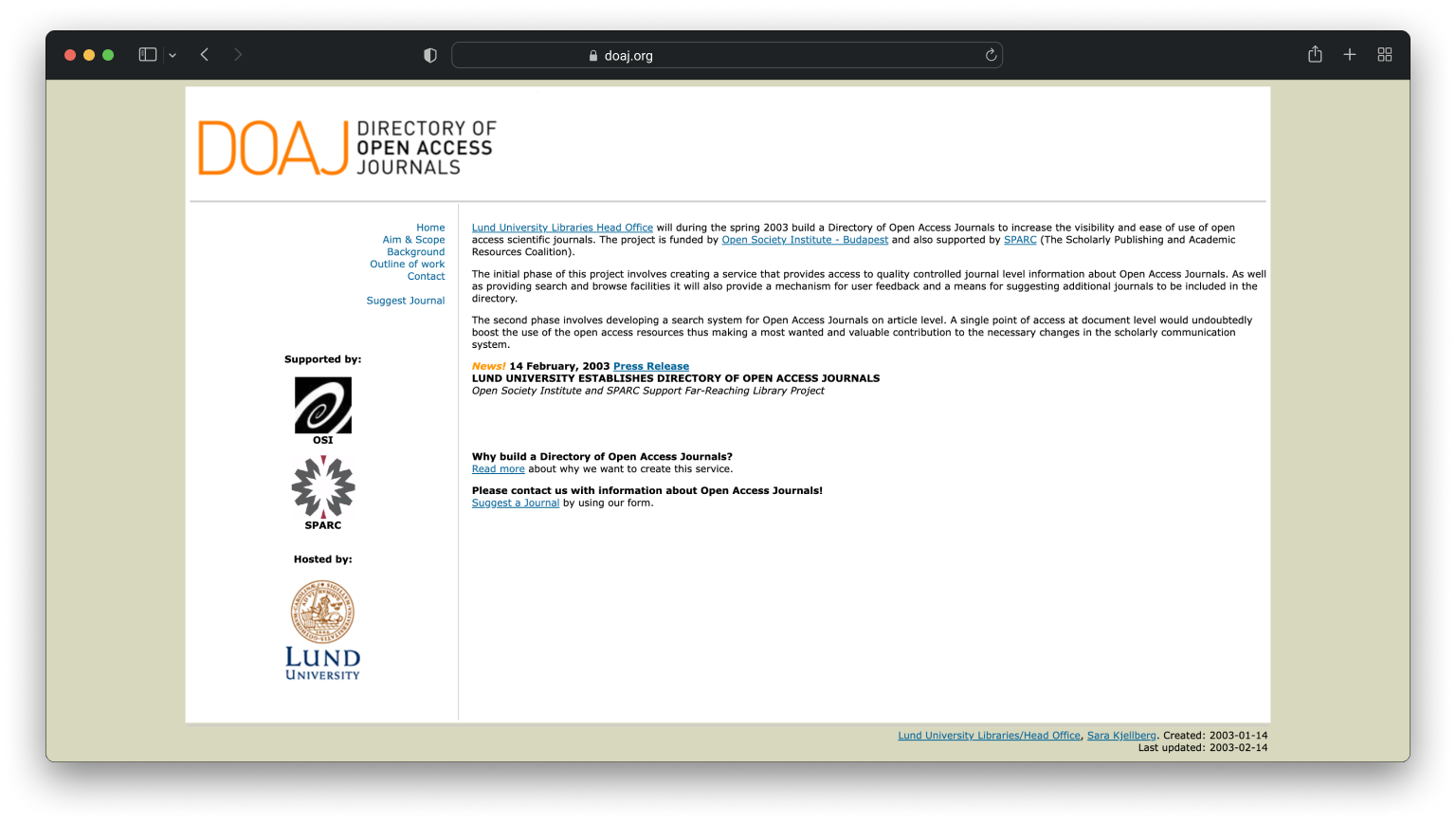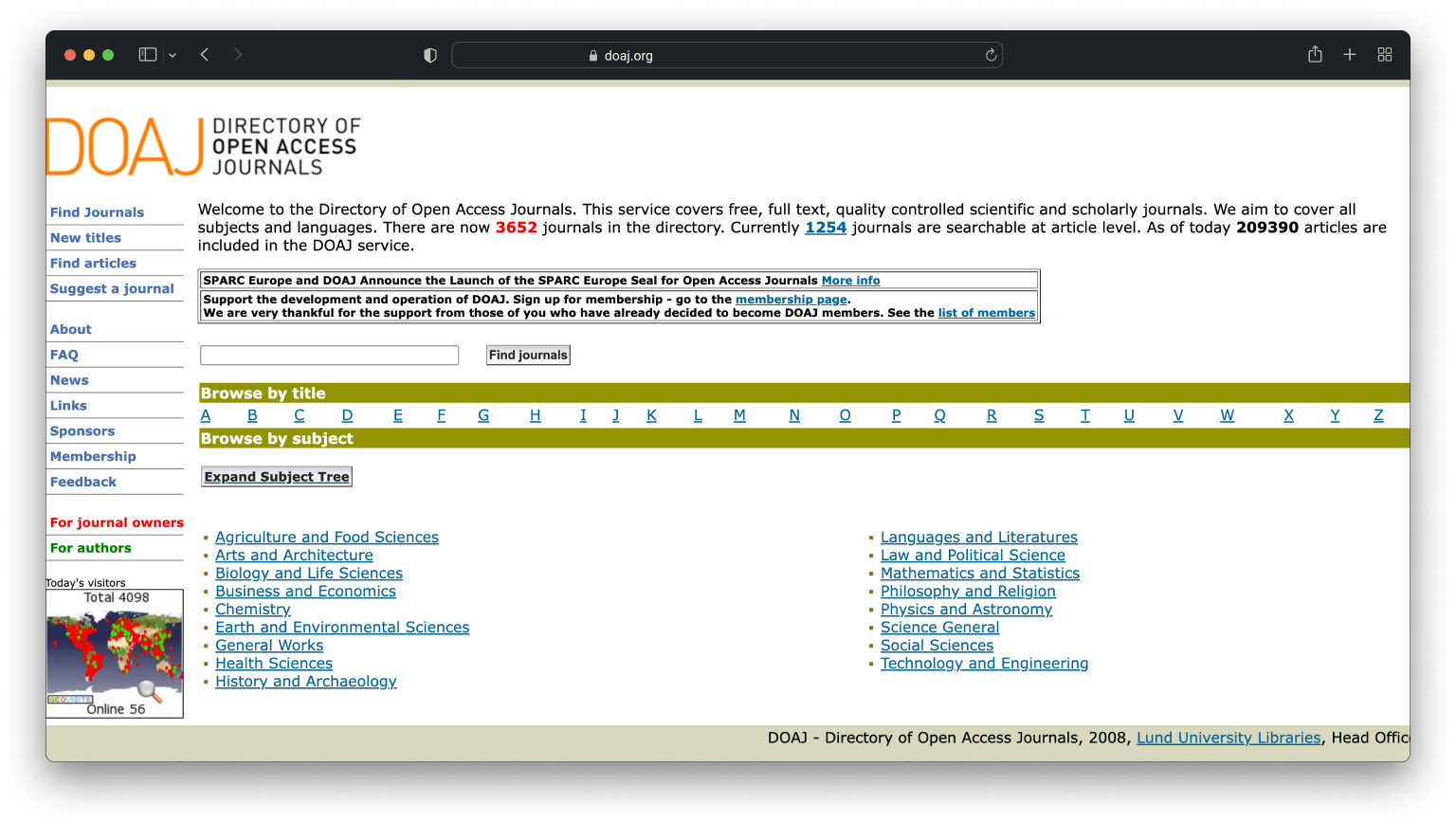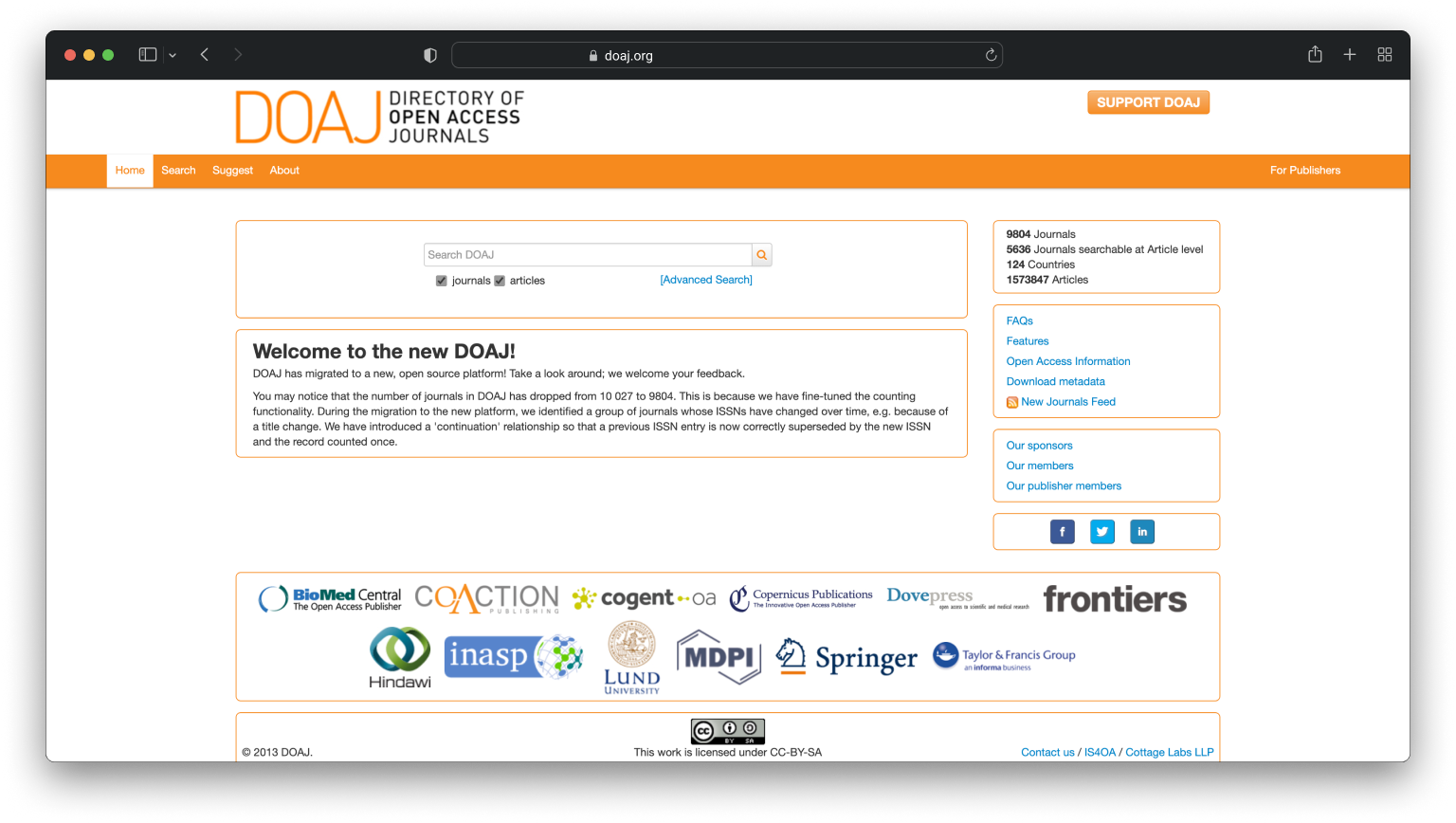DOAJ at 20
In 2023, we celebrated 20 years of being an important part of open infrastructure with a year-long campaign throughout the year.
We hosted three events events for our community around the themes: 'Open', 'Global', and 'Trusted'. Details about the event and links to the recordings can be found further down this page.
Below is a historical timeline providing an overview of DOAJ’s important milestones from 2003 to 2023.
We also set up a Paypal campaign to celebrate 20 years of DOAJ. Though we have now concluded the DOAJ at 20 celebrations, the Paypal campaign will remain open, and we welcome any donations from our community. We greatly appreciate the support we have received so far.
The Events
- Recording is available
- Name: DOAJ at 20: Open
- Date: 15th June 2023
- Event Time: 13:00 UTC
- Duration: 90 mins
- Recording is available
- Name: DOAJ at 20: Global
- Date: 28th September 2023
- Event Time: 13:00 UTC
- Duration: 2 hours
- Recording is available
- Name: DOAJ at 20: Trusted
- Date: 7th December 2023
- Event Time: 14:00 UTC
- Duration: 90 mins
Open
Our first of three events marking our 20th anniversary took place on the 15th June 2023. The event was built around the theme ‘open’, where our moderator (Abeni Wickham) had a conversation with our three guests: Lars Bjørnshauge, Mikael Laakso, and Nadine Buckland. The discussion focused on development and changes over the last 20 years, with reflections from all speakers on what the next years will bring. A recording of the event is available on YouTube.
Global
Our second event was around the theme Global and took place on the 28th September 2023. The event consisted of eight lighting talks from speakers from around the world. Our moderator and DOAJ Ambassador, Ivonne Lujano, introduced speakers and managed two Q&As, where the audience could ask our speakers questions. A recording of the event is available on YouTube.
Trusted
Our third and last DOAJ at 20 event was around the theme Trusted and took place on the 7th December 2023. Our four speakers, Judith Barnsby, Ivan Oransky, Ixchel Faniel and Dr Haseeb Irfanullah discussed what trust in scholarly publishing meant to them and their communities. Different aspects of trust were also discussed, including transparency, timeliness, justice and accountability. The event was moderated by Joy Owango, Founding Director of TCC Africa. A recording of the event is available on YouTube.
Timeline
- 12th May 2003
- DOAJ is born: by the community and for the community
- The Budapest Open Access Initiative has been published. At the 2002 Nordic Conference on Scholarly Communication, Lund, Sweden, the idea of a directory of pure open access journals is raised. Lars Bjørnshauge, Head Librarian at Lund and future Founder of DOAJ, takes this task on. On 12th May 2003, DOAJ launches with around 300 titles from a list generated by Bo-Christer Björk.
- ‘Moreover, some of the projects and the institutional repositories that universities have established have sidestepped the established mechanisms that give order and structure to the published literature. There is no catalogue of open access journals. They do not have ISSNs, and are not … indexed in the relevant abstracting and indexing services. They do not use the DOI (Digital Object Identifier) or CrossRef, the system of links from citations to full text. However worthwhile they may be, if they are not integrated into the existing scholarly literature environment, they will not be found.’
- — ‘The First Nordic Conference on Scholarly Communication’. Information Services & Use 1 Jan. 2002 : 191 – 194. https://doi.org/10.3233/ISU-2002-22407

- See the website’s archived version
- Nov 2003 to May 2007
- Major technical developments
- DOAJ records are available to download in CSV format
- Searching by article is introduced
- We reach a milestone: over 2,000 journals are indexed
- A new metadata format called
doajArticleis added to the OAI-PMH interface 
- See the website’s archived version
- December 2012
- A 10th birthday is coming and DOAJ prepares for another ten years
- IS4OA, DOAJ’s new parent company announces a new path of improvement and development for DOAJ, including plans for extended and more rigorous criteria.
- June 2013
- New criteria and the Seal
- In March, a new extended set of criteria and a new application form are announced and put out for public consultation, with the hashtag #doajcriteria. They are designed to keep questionable publishers and journals out.
Today we had a great session on #DOAJcriteria with the wonderful publishers network of @UNAM_MX @DOAJplus #DOAJambassadors pic.twitter.com/fd8mdB8ORG
— Ivonne Lujano (@ivonnelujano) September 22, 2016
- January-May 2014
- New platform and new criteria
- The new extended set of criteria and a new application form are launched. In May, DOAJ announces that 99.3% of the ~10,000 journals indexed will need to reapply under the new criteria if they wish to remain indexed. At the same time, DOAJ publishes a list of journals that are added and removed.

- See the website’s archived version
- July 2014
- Over 6,300 applications
- In January, DOAJ puts out a call to its communities for help in processing the reapplications. Crowdsourcing librarian power is a new approach to help cope with the increasing number of applications being submitted. DOAJ launches its volunteer network on 1st July with three teams: Chinese, English, and Spanish.
- June 2016
- Ambassador program is launched
- With a grant from the IDRC, DOAJ launches its Ambassador program and introduces its new Ambassadors to the world. Over time, this proves to be one of DOAJ’s most valuable and successful initiatives and today, it is a model that is copied by many other organisations in the industry.
- December 2017
- Reapplication project is complete
- After three years of hard work, DOAJ announces that its reapplication project is finally complete and the last reapplication has been processed. The Editorial Team has rejected reapplications from 2058 journals and then removed a further 2860 journals that never submitted a reapplication. Heavy losses are seen among journals from Japan, Pakistan, Canada, United States and Mexico.
- September 2018
- Plan S includes DOAJ-indexing
- Plan S announces its ambitious vision for an OA future, which is closely aligned to DOAJ's work. Plan S has a massive impact on DOAJ, which, over the next four years, will see a surge in applications due to DOAJ-indexing being a vital component of the Journal Checker Tool.
- November 2020
- A new image, a new application form, a new project
- DOAJ has listened to its publisher community and makes radical changes to its application form to improve the user experience. Some questions are removed from the form. It is now easier for an application to be submitted, or for a user to save their progress. The DOAJ criteria are rewritten for clarity and published online for the first time, in plain English. Usage on mobile devices increases steadily as the site is responsive and more accessible. DOAJ gets a new logo for first time since 2003. At the same time, DOAJ kicks off Project JASPER, a new iniative to help preserve open access journals.

- See the application’s archived version
- January 2022
- The next chapter
- Lars has announced that he is stepping down from DOAJ and a new Managing Director, Joanna Ball, has taken over. A new chapter begins as Joanna expands the team to cover crucial areas of operation. DOAJ endorses the Action plan for Diamond Open Access, partners with OpenAIRE, and joins two large European projects, DIAMAS and CRAFT.
- 12th May 2023
- Twenty years old
- Happy 20th birthday, DOAJ! We look forwards to another twenty years.
Support our anniversary campaign
As a crucial open infrastructure, DOAJ relies on donations from supporting organisations to help keep it running to provide the services the community relies on and trusts.
We launched a fundraising campaign for our 20th year, and the campaign is still open for donations.
We thank you in advance for your contribution.
Our sponsors
The 'DOAJ at 20' event series was sponsored by the following organisations:
DOAJ is grateful for their support without which our webinar series would not have been possible.
